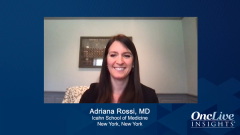
Triple-Class Refractory MM: Factors in Selecting Optimal Therapy
Shared insight on factors that help to determine optimal therapy for patients diagnosed with triple-class refractory multiple myeloma.
Episodes in this series

Transcript:
Luciano Costa, MD: We have a plethora of phase 3 trials that give us guidance in terms of agents or combinations to choose. However, very few of those address the patients who have disease that is lenalidomide-refractory. When you have a patient who is not exposed to lenalidomide, or the disease has not progressed on lenalidomide, then you have lenalidomide-based options. For example, with daratumumab or carfilzomib, or even with bortezomib, or elotuzumab, or even ixazomib. When you have a bortezomib-naive trial, you have the options of carfilzomib and dexamethasone alone, or bortezomib combinations; for example, bortezomib in combination with daratumumab as shown in the CASTOR trial. We increasingly see more and more patients who have disease that is lenalidomide-refractory because the widespread use of lenalidomide is part of the initial therapy and continuous maintenance therapy. For those patients, we tend to have fewer choices.
Essentially, we have pomalidomide-based combinations like with pomalidomide-elotuzumab-dexamethasone or pomalidomide-daratumumab-dexamethasone, or carfilzomib-based combinations, like carfilzomib-dexamethasone or carfilzomib-daratumumab-dexamethasone, carfilzomib-isatuximab-dexamethasone as in the ICARIA trial. Or less well studied but often used is carfilzomib-cyclophosphamide-dexamethasone. Choosing between those agents can be quite complex. We always take into consideration the patient’s disease refractoriness, essentially avoiding, if at all possible, a class of agents for which the disease has shown to be refractory, but also taking into consideration the activity, the aggressiveness of the progression, and sometimes some disease features like the presence of high-risk abnormalities. Dr Rossi, in your case, the patient had somewhat of a good response to initial therapy, but then the disease quickly becomes what we call now triple-class refractory. The disease shows itself to not respond to at least 1 PI [proteasome inhibitor], 1 IMiD [immunomodulatory imide drug], and a CD38 monoclonal antibody. We know those are the real challenges. Tell us a little bit about your decision-making; how did you choose this particular therapy over any other available?
Adriana Rossi, MD: Exactly to your point was where I started. She has already seen 2 PIs, 2 IMiDs, and the CD38. These are patients who are notoriously in a dire need of a novel therapy, and she had a very good performance status. I think as with the start of any therapy, you consider the disease itself. As you’ve mentioned, she was having progressive poor-risk features accumulating. You consider the rest of her very limited comorbidities; she had a very good performance status. Also taking into consideration her prior therapies, all of which she tolerated very well and had some response to. I know we all see these patients who, despite disease control over many years, never quite reach that CR [complete response], or what is now the grail of MRD [minimal residual disease] negativity. I’ve been very encouraged to date with the ability of these T-cell redirecting therapies to get these deep responses in patients who are penta-exposed and triple-class refractory for these studies. She also didn’t have anything that was BCMA [B‑cell maturation antigen] targeting, which I think is another great question now in our relapsed setting, as we have multiple modalities to target a single target. How do we put all of those together?
Transcript edited for clarity.






































